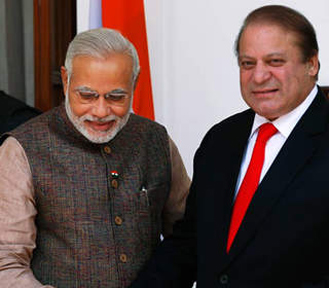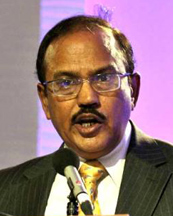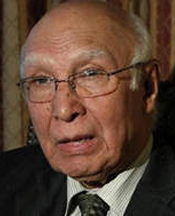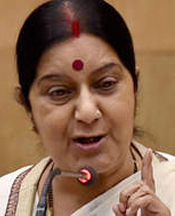|
India-Pakistan rapprochement:
|

Narendra Modi and Nawaz Sharif (topnews.com) |
So near, yet so far
by Stanley Mathews
India and Pakistan, twins born within hours of each other in August
1947, have been in perpetual conflict since birth. And the bone of
contention has been the same right through - the sylvan valley of
Kashmir. Pakistan claims Kashmir because it is predominantly Muslim, and
India refuses to give it because it believes that religion cannot be a
basis of territorial claims.
The first war over Kashmir was fought in 1948, the very first year of
the existence of the two nations. And the latest stand-off took place
this very month, 67 years down the line, when Pakistan called off
National Security Advisor (NSA) level talks scheduled for August 23 and
24. Islamabad was unable to accept India's insistence that the Pakistani
NSA, Sartaj Aziz, should not invite Kashmiri separatists to a reception
at the Pakistan High Commission in New Delhi.
However, despite four hot wars fought in 1948, 1965, 1971 and 1999,
the leaders of the two countries have made several attempts to bridge
the divide and get on with the task of developing themselves.
But the leaders' efforts have not borne fruit because of domestic
compulsions and powerful internal lobbies. In Pakistan, the stumbling
blocks have been: (1) the peoples' enduring commitment to the
acquisition of Kashmir as part of the division of the Indian
subcontinent on religious lines in 1947 and (2) the military, for which,
conflict with India is necessary to maintain its pre-eminent status as a
power in Pakistan's domestic affairs.
In India, on the other hand, the stumbling blocks are: (1) a
widespread feeling that giving up Kashmir because it is Muslim will mean
acceptance of Mohammad Ali Jinnah's specious theory that Hindus and
Muslims are two different nations who cannot coexist and (2) a belief
among national political parties that a tough policy on Pakistan and
Kashmir is necessary for political survival.
|

Indian National Security Advisor
Ajit Doval (hindustantimes.com) |
After the 1948 war in Kashmir, which resulted in India keeping
two-thirds of it and the bulk of the population, there was a UN-brokered
peace which saw the settlement of several issues, including those
related to the use of river waters. The Pakistan cricket team toured
India in the early 1950s to a rousing welcome everywhere.
But Kashmir could not be kept on the backburner for long. In
September 1965, Pakistan attempted to take Kashmir again. The 1965 war
resulted in the Tashkent Agreement by which captured territories were
handed back. But it was back to war again in 1971 when India intervened
on the side of the East Pakistani liberation movement on humanitarian
and strategic grounds, dividing Pakistan into two.
Search for peace
Continued conflict inevitably leads to a search for peace, or at
least some respite. In 1999, the civilian government of Nawaz Sharif in
Pakistan began a process of rapprochement with India, then led by the
moderate BJP leader Atal Behari Vajpayee. But then Pakistan Army Chief,
Gen. Pervez Musharaff, derailed the process by starting a war in the
heights of Kargil in Kashmir. A timely US intervention forced Pakistan
to withdraw and Sharif was overthrown by Gen. Musharaff in a military
coup.
The impact of this was seen in Pakistan-India relations soon enough.
In October 2001, Kashmir's Legislative Assembly was attacked. This was
followed by an attack on the Indian Parliament in December that year.
India pointed an accusing finger at Pakistan and mobilized its forces on
the Line of Control in Kashmir to precipitate what was described as an
'eye ball to eye ball' confrontation.
With the US and the West warning of the possibility of a nuclear war,
President Musharaff and Indian Prime Minister Vajpayee began 'back
channel' consultations in 2002. While Musharaff named noted diplomat,
Tariq Aziz, as his interlocutor, Vajpayee named his National Security
Advisor, Brajesh Mishra. Being an army man, Musharaff had the Pakistan
Army on board with the then Inter-Service Intelligence (ISI) Chief,
Gen.Ashfaq Kayani, attending the back channel meetings.
|

Pakistan National Security Advisor Sartaj Aziz (oneindia.com) |
|

Indian External Affairs Minister
Sushma Swaraj (oneindia.com) |
According to a recent book written by former Pakistan Foreign
Minister, Khurshid Mahmud Kasuri, Musharaff had publicly stated that he
was for the abolition of the Line of Control in Kashmir and for Joint
Indo-Pakistan Control over Kashmir. In other words, he was giving up
Pakistan's demand for a referendum (or plebiscite) in Kashmir to test
the will of the people. During those days of bonhomie in January 2004,
Vajpayee visited Islamabad for the SAARC summit, and the Indian cricket
team toured Pakistan after a long gap. A bus service between Lahore and
Delhi was started.
But in 2006, there were deadly bomb blasts in Mumbai killing
hundreds. In 2007, the Train of Understanding (Samjhauta Express)
running between India and Pakistan was bombed near New Delhi, killing a
lot of Pakistani passengers. The very next year, in 2008, terrorists
attacked multiple high profile commercial targets in Mumbai, killing
hundreds. The mastermind, identified as Zakiur Rahman Lakhvi, was
arrested by the Pakistani police but, to India's chagrin, he got out on
bail.
While the Pakistanis complained that India was not giving sufficient
evidence, the Indians said Pakistan was not giving Lakhvi's voice
samples. India also complained that Pakistan was not extraditing the
other mastermind of the Mumbai attacks, Dawood Ibrahim.
However, when Nawaz Sharif became Prime Minister again in 2013, he
held out a hand of friendship to India. But the moment he announced it,
suspected Pakistani terrorists attacked the Indian Consulate in
Jalalabad in Afghanistan. When Sharif announced his intention to attend
the swearing-in ceremony of Indian Prime Minister Narendra Modi in May
2014, the Indian Consulate in Herat in Afghanistan was attacked.
Fresh talks
However, despite these provocations, India and Pakistan decided to
hold Foreign Secretaries level talks in Islamabad in August 2014. But
before the talks, the Pakistani High Commissioner in India, Abdul Basit,
held talks with the Kashmiri separatist leader, Shabbir Shah, raising
hackles in the Indian Establishment, which believes there is no room for
Third Parties in settling the Kashmir issue. India called off the
Foreign Secretaries-level talks.
But the gruesome massacre of 132 school kids by Pakistani Jehadists
at an army school in Peshawar in Pakistan in December 2014, made the
leaders of Pakistan and India to think of co-operation to fight
terrorism jointly. Threads were picked up in July 2015, when Sharif and
Modi met on the sidelines of the Shanghai Cooperation Council conference
at Ufa in the Russian Federation.
The two leaders agreed to begin talks on all outstanding issues,
particularly terrorism. For convenience sake, Sharif overlooked Kashmir
and it was not specifically mentioned in the agreement. It was also
agreed that the National Security Advisors (NSAs) of the two countries,
Sartaj Aziz and Ajit Doval, would meet to discuss terrorism.
But when the Indian TV stations gloated over the non-mention of
Kashmir and portrayed that as a triumph for India, Sharif developed cold
feet and began to feel the need to bring Kashmir to the fore to
safeguard his political position in Pakistan. The Pakistani High
Commissioner in New Delhi was asked to invite leaders of the Hurriyat
Conference (a group of Kashmir separatist outfits) for a reception at
the Mission to give the impression that the Kashmir issue has not been
shelved.
But the invitation to a reception again raised hackles in the Indian
Establishment which "advised" Pakistan to desist from inviting the
separatists. Indian Foreign Minister Sushma Swaraj pointed out that such
a meeting would be a violation of the Shimla Agreement of 1972,
according to which there is no place for a Third Party and also a
violation of the Ufa agreement according to which the talks between the
NSAs should only be on terrorism and not Kashmir. Pakistan argued that
Kashmir would be discussed as part of the talks on terrorism; that the
Ufa agreement did not bar discussion on issues other than terrorism;
and, at any rate, meetings with the Hurriyat have been a routine affair
for two decades.
According to some commentators, both India and Pakistan wanted to
break the talks and appear tough in defence of their political interest.
Sharif wanted Pakistanis to see that he could be unyielding on the core
issue of Kashmir, and Modi wanted to show his people, before the crucial
November elections to the Bihar State Assembly, that he is a tough
nationalist leader who will not be soft on 'Pakistan, terrorists and
separatists.'
Modi needs to shore up his political image as it is tough going in
Bihar, where his BJP faces a united Janata Parivar Front led by the
formidable duo, Lalu Prasad Yadav and Nitish Kumar. If he loses Bihar,
the way he lost Delhi, his image as a 'Political Superman' will be badly
dented.
However, while the political leaders on both sides of the divide are
trying to safeguard their interests, peace lovers in India and Pakistan
and the world at large, are dismayed over the cancellation of the NSA
level talks.
UN Secretary General Ban Ki-moon has said that the cancellation was
regrettable and the US said it was unfortunate. A fair section of the
Indian and Pakistani media has decried the cancellation. Some feel that
India had lost an opportunity to push Pakistan to take action in the
Mumbai bombings case. Pakistanis feel that they had lost an opportunity
to expose India's role in fomenting separatism in Baluchistan and to
discuss Kashmir.
In an article in The Hindu, former Indian diplomat, Rakesh Sood, said
that frequent cancellation of talks will result in India's neighbours
and the world seeing New Delhi's foreign policy in bad light. The West
would be encouraged to give India "gratuitous advice." Constant tension
with Pakistan over Kashmir will not allow New Delhi to attend to the
existential needs of the Kashmiris who also need economic development.
Sood says that both sides seem to be playing a zero sum game, in
which there is only one winner who takes it all. While the zero sum game
is alright in a battlefield, it is no good in diplomacy where to declare
real success, both sides should feel that its interests have been
safeguarded. It has to be a 'win-win' result for a diplomatic engagement
to be termed successful. A 'lose-lose' result only perpetuates the
conflict the two sides are trying to end. |

